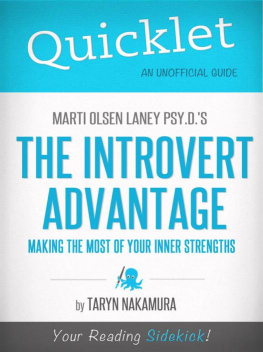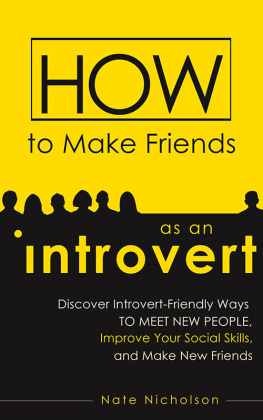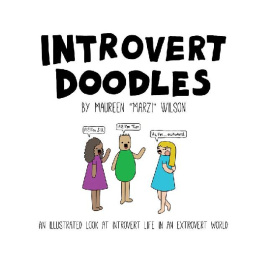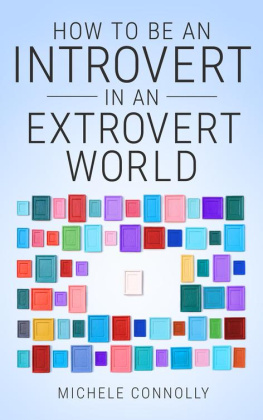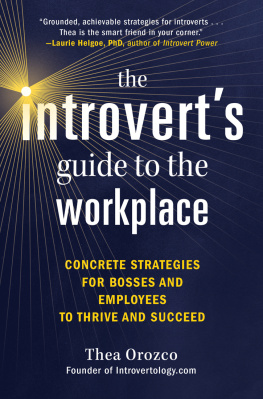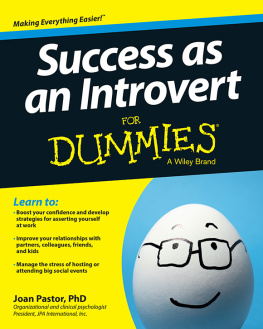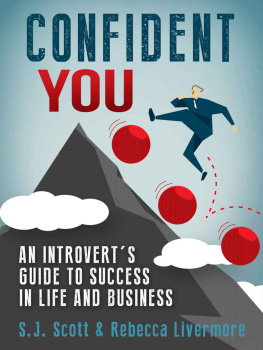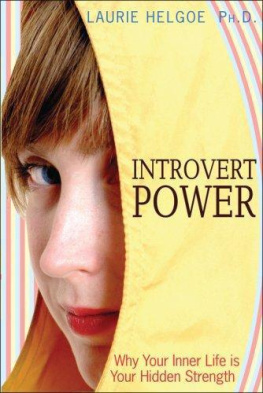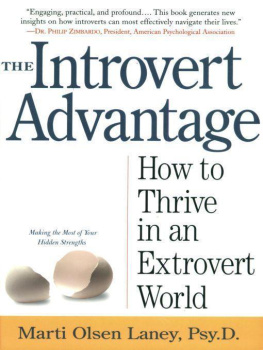The Introvert Advantage
How to Thrive in an Extrovert World
Marti Olsen Laney, Psy.D.
WORKMAN PUBLISHING NEW YORK
Copyright 2002 by Marti Olsen Laney
Illustrations copyright 2002 by Harry Bates
Cover design by Paul Gamarello
All rights reserved. No portion of this book may be reproducedmechanically, electronically, or by any other means, including photocopyingwithout written permission of the publisher. Published simultaneously in Canada by Thomas Allen & Son Limited.
All personal vignettes, anecdotes, and stories are from my life or the lives of my clients, people I interviewed, or those attending my workshops or presentations. However, I have altered and commingled peoples names and identifying details in order to preserve their privacy.
Laney, Marti Olsen.
The introvert advantage/Marti Olsen Laney.
p. cm.
Includes bibliographical references and index.
eISBN 9780761148357
1. Introversion. 2. Interpersonal relations. I. Title.
BF698.35.I59 L36 2001
155.232dc21 2001026987
Workman books are available at special discounts when purchased in bulk for premiums and sales promotions as well as for fund-raising or educational use. Special editions or book excerpts can also be created to specification. For details, contact the Special Sales Director at the address below.
Workman Publishing Company, Inc.
225 Varick Street
New York, NY 10014-4381
www.workman.com
Dedication
Feeling gratitude and not expressing it is like wrapping a gift and not giving it.
WILLIAM A. WARD
To my husband of thirty-eight years, Michael, who dragged me out into extroverting and enlarged my universe. I dedicate this book to you for coaching me to keep breathing through the long labor of the book birthing process. And you are awarded the Highest Medal of Husbandry Honor for devoting so many hours to read page after page about introverts (more than any mortal extrovert should ever have to). Last, but not least, a final thank-you for delivering nourishing meals to me as I sat staring and pecking at my computer.
To my daughters and their families, whom I love very much and who have enriched my life in countless ways:
Tynna, Brian, Alicia, and Christopher DeMellier
Kristen, Gary, Kaitlin, and Emily Parks
I also dedicate this book to all of my clients who have courageously let me into their lives.
Acknowledgments
I would like to thank everyone Ive met in my life.
MAUREEN STAPLETON
It takes a lot of midwives to birth a book. I would like to thank my dear friend Valerie Hunter, for knowing I could write before I did. Sylvia Cary, for confirming I was pregnant with a book idea and giving me invaluable feedback about the neonate. My agent, Andrea Pedolsky, for recognizing the possibilities in the book proposal and her ongoing encouragement throughout the elephantine labor. Peter Workman and Sally Kovalchick, who were aware that introverts needed a book to be born about them. My editors, Margot Herrera and Kitty Ross, for combing through my right-brained manuscript and untangling snarls with their left-brained minds. Tia Maginni, who must have ESP to be able to decode the arrows, cross-outs, and smudged ink on the manuscript. Thank you to all those at Workman Publishing, for laboring until the book was born.
A special thank-you to all those introverts I interviewed for this book. I would also like to thank all the dedicated scientists and researchers in the many fields who strive to help all of us to understand the simply complex humans we are.
Prelude
It is the chiefest point of happiness that a man is willing to be what he is.
ERASMUS
Growing up, I was often puzzled about myself. I was full of confusing contradictions. An odd duck. I did so poorly in first and second grade that my teachers wanted me to repeat, yet in third grade I did very well. Sometimes I was very animated and talkative, making crisp, informed comments. In fact, if it was a subject I knew about, I could talk someones arm and leg off. Other times I wanted to speak, but my mind was blank. Or I would think of something to say in class, raise my handthrilled that I might improve the 25 percent of my grade that was based on class participationbut when I was called on, my comment would disappear into thin air. My internal screen would go dark. I wanted to crawl under my desk. Then there were the times when my remarks would come out in some halting, unclear form, making me sound much less knowledgeable than I was. I developed all sorts of techniques for avoiding the teachers eyes when she was scanning the class for someone to answer a question. I couldnt rely on myself; I never knew how I would react.
Confusing me further was that when I did express myself out loud, people often told me I was well spoken and concise. Other times my classmates treated me as if I were mentally disabled. I didnt think I was stupid, but I didnt think I was sharp as a tack either.
The way my brain worked puzzled me. I couldnt figure out why I could think of lots of comments after the fact. When I gave my opinion about something that had happened earlier, teachers and friends would ask, in an irritated tone, why I hadnt spoken up before. They seemed to think I was purposely withholding my thoughts and feelings. I found my thoughts were like lost airline baggage; they arrived some time later.
As I grew up, I began to think of myself as a stealth person, running silent, deep, and invisible. Many times I would say something, and no one would respond. Later, another person might say the same thing and he or she would be acknowledged. I would think there was something wrong with the way I spoke. At other times, when people heard me speak or read something I wrote, they would look at me with a stunned expression. It happened so many times that the look had become very familiar to me. It seemed to say, You wrote this? I felt mixed about this reaction because I liked being acknowledged but I also felt overwhelmed by the attention.
Socializing was also a confusing experience. I enjoyed people, and people seemed to like me, but I often dreaded going out. I would go back and forth deciding whether to show up at a party or public event. I concluded I was a social chicken. Sometimes I felt awkward and uncomfortable; at other times I felt okay. Even when I was having a wonderful time, I was eyeing the door and fantasizing about snuggling in bed in my pajamas.
Another source of pain and frustration was my low energy. I got fatigued easily. I didnt seem to have the same stamina as my friends and family. When I was tired, I walked slowly, ate slowly, and talked slowly, with lots of agonizing gaps in my conversation. On the other hand, if I was rested, I could chat so fast, jumping from thought to thought, that the people I was with may have felt blitzed. In fact, some people thought I had a lot of energy. Trust me, I didnt (and still dont).
Yet even with my slow pace I trudged along until I ended up accomplishing most of what I wanted with my life. It took me years to discover that all of my puzzling contradictions actually made sense. I was a normal introvert. This discovery brought me such relief!
Overture
Democracy cannot survive without the guidance of a creative minority.
HARLAN F. STONE
Remember when we were kids and compared belly buttons? Back then it was considered better to be in innie than an outie. Nobody wanted a belly button that stuck out, so I was glad mine went in.
Later, when innie came to mean introvert in my mind, and outie came to mean extrovert, it was the opposite. Extrovert was good. Introvert was bad. Since no matter how hard I tried I didnt have those extroverted qualities, and I thought something was wrong with me. I didnt understand many things about myself. Why did I feel overwhelmed in environments that thrilled other people? Why did I come away from outside activities feeling as if I were gasping for air? Why did I feel like a fish out of water?


